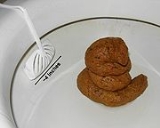
Human feces
Overview
Human feces also known as a stool, is the waste product of the human digestive system including bacteria. It varies significantly in appearance, according to the state of the digestive system, diet
and general health
.
Normally stool is semisolid, with a mucus coating. Small pieces of harder, less moist feces can sometimes be seen impacted on the distal (leading) end. This is a normal occurrence when a prior bowel movement is incomplete, and feces
are returned from the rectum
to the intestine
, where water is absorbed.
Meconium
(sometimes erroneously spelled merconium) is a newborn baby's first feces.
The Bristol Stool Chart or Bristol Stool Scale is a medical aid designed to classify the form of human feces into seven categories.
Diet (nutrition)
In nutrition, diet is the sum of food consumed by a person or other organism. Dietary habits are the habitual decisions an individual or culture makes when choosing what foods to eat. With the word diet, it is often implied the use of specific intake of nutrition for health or weight-management...
and general health
Health
Health is the level of functional or metabolic efficiency of a living being. In humans, it is the general condition of a person's mind, body and spirit, usually meaning to be free from illness, injury or pain...
.
Normally stool is semisolid, with a mucus coating. Small pieces of harder, less moist feces can sometimes be seen impacted on the distal (leading) end. This is a normal occurrence when a prior bowel movement is incomplete, and feces
Feces
Feces, faeces, or fæces is a waste product from an animal's digestive tract expelled through the anus or cloaca during defecation.-Etymology:...
are returned from the rectum
Rectum
The rectum is the final straight portion of the large intestine in some mammals, and the gut in others, terminating in the anus. The human rectum is about 12 cm long...
to the intestine
Intestine
In human anatomy, the intestine is the segment of the alimentary canal extending from the pyloric sphincter of the stomach to the anus and, in humans and other mammals, consists of two segments, the small intestine and the large intestine...
, where water is absorbed.
Meconium
Meconium
Meconium is the earliest stools of an infant. Unlike later feces, meconium is composed of materials ingested during the time the infant spends in the uterus: intestinal epithelial cells, lanugo, mucus, amniotic fluid, bile, and water. Meconium is almost sterile, unlike later feces, is viscous and...
(sometimes erroneously spelled merconium) is a newborn baby's first feces.
The Bristol Stool Chart or Bristol Stool Scale is a medical aid designed to classify the form of human feces into seven categories.

